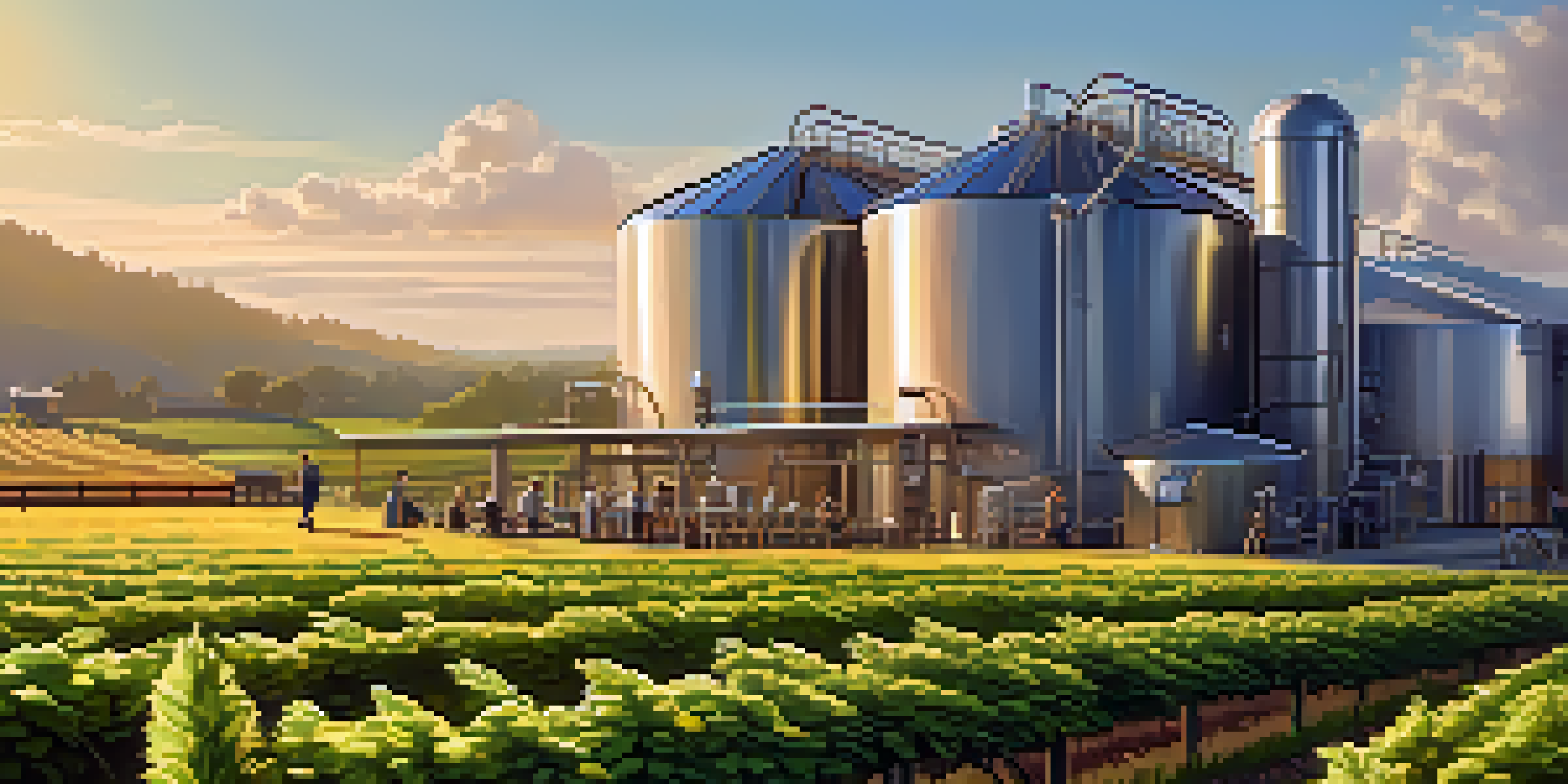Sustainability in California's Craft Beer Industry Explained

The Rise of Craft Beer and Its Environmental Impact
California has long been a leader in the craft beer movement, producing a diverse array of unique brews. However, the rise of this industry has also led to increased scrutiny regarding its environmental footprint. From water usage to energy consumption, the impact of brewing on the planet calls for innovative solutions.
Brewing beer is a journey, and sustainability is the path we must take to ensure that we can continue to enjoy the fruits of our labor without compromising the planet.
As beer enthusiasts flock to local breweries, the demand for sustainable practices grows. Many breweries are realizing that adopting eco-friendly methods not only benefits the environment but also attracts conscious consumers. This shift highlights the interconnectedness of craft beer culture and sustainability efforts.
In California, the craft beer industry is taking significant steps to mitigate its impact. Breweries are rethinking their processes, sourcing ingredients locally, and exploring renewable energy options to lessen their carbon footprint. This growing emphasis on sustainability is shaping the future of the industry.
Water Conservation: A Critical Focus for Breweries
Water is an essential ingredient in beer, making conservation crucial for breweries, especially in California's often drought-affected regions. Many craft breweries are implementing water recycling systems and investing in technologies to reduce water usage during the brewing process. These efforts are vital for preserving this precious resource.

For instance, some breweries have adopted closed-loop systems that allow them to reuse water multiple times before it is discarded. This not only conserves water but also significantly reduces the overall costs associated with sourcing fresh water. By prioritizing water efficiency, breweries can thrive while being responsible stewards of the environment.
Craft Beer and Sustainability Unite
California's craft breweries are adopting eco-friendly practices to reduce their environmental impact while appealing to conscious consumers.
Additionally, breweries are engaging in community efforts to raise awareness about water conservation. By hosting events and collaborating with local organizations, they encourage both consumers and other businesses to adopt sustainable practices. Through these initiatives, craft breweries are not just brewing beer; they are brewing change.
Energy Efficiency: Brewing with a Lighter Footprint
Energy consumption is another area where California's craft breweries are making strides toward sustainability. Many breweries are investing in energy-efficient equipment and exploring renewable energy sources like solar power. These choices help reduce greenhouse gas emissions and lower operating costs.
The craft beer movement is about more than just great taste; it's about creating a community that cares for the environment.
For example, some breweries have installed solar panels to harness the sun's energy, powering their operations while reducing reliance on fossil fuels. This transition not only supports the environment but also enhances the brewery's brand image, appealing to environmentally-conscious consumers. It's a win-win situation for everyone involved.
Moreover, breweries are adopting best practices in energy management, such as monitoring their energy usage and implementing energy-saving technologies. By constantly evaluating and optimizing their energy consumption, they can ensure a sustainable brewing process that aligns with their environmental goals.
Sustainable Sourcing: Local Ingredients Matter
Sourcing ingredients locally is a key component of sustainability in the craft beer industry. California's rich agricultural landscape provides an abundance of hops, grains, and other resources that breweries can utilize. By supporting local farmers, breweries not only reduce transportation emissions but also strengthen community ties.
Many craft breweries are forming partnerships with nearby farms to ensure fresh, high-quality ingredients while promoting sustainable farming practices. This collaborative approach not only enhances the flavor profiles of their beers but also fosters a sense of community and shared responsibility for the environment.
Water Conservation is Essential
With water being a critical ingredient, many breweries are implementing recycling systems to minimize water usage and promote conservation.
Furthermore, using organic and sustainably grown ingredients is becoming a popular trend among California's craft brewers. This commitment to quality and sustainability resonates with consumers who are increasingly looking for products that reflect their values. As a result, breweries that prioritize local sourcing are carving out a niche in a competitive market.
Waste Reduction: From Grain to Glass
Waste reduction is a significant focus for many California craft breweries. The brewing process generates a substantial amount of byproducts, such as spent grains, which can be repurposed rather than discarded. Innovative breweries are finding creative ways to minimize waste and promote a circular economy.
For instance, some breweries donate their spent grains to local farms as animal feed, while others transform them into flour for baking. This not only reduces landfill waste but also supports local agriculture. These initiatives showcase how breweries can play a role in fostering sustainability beyond just brewing.
Additionally, many breweries are implementing recycling and composting programs to manage other forms of waste, such as packaging materials. By prioritizing waste reduction, they contribute to a healthier planet and inspire other businesses to follow suit. In doing so, they demonstrate that sustainability can be integrated into every aspect of their operations.
Community Engagement: Crafting a Sustainable Future Together
Community engagement is crucial for fostering a culture of sustainability within the craft beer industry. Many California breweries actively participate in local initiatives and collaborate with organizations focused on environmental conservation. These partnerships not only strengthen community ties but also amplify their sustainability efforts.
For example, some breweries host cleanup events, educational workshops, and fundraising initiatives aimed at promoting environmental awareness. By involving the community, they create a sense of shared responsibility and inspire others to adopt sustainable practices. This grassroots approach can lead to significant positive changes in local ecosystems.
Local Sourcing Boosts Sustainability
By sourcing ingredients locally, breweries not only reduce transportation emissions but also support local farmers and enhance their community ties.
Moreover, breweries are increasingly transparent about their sustainability goals and achievements, inviting consumers to join the conversation. This openness fosters a sense of accountability and encourages other businesses to follow their lead. Together, they can craft a more sustainable future for California's craft beer industry.
The Future of Sustainable Craft Beer in California
The future of California's craft beer industry is undeniably tied to sustainability. As consumer awareness and demand for eco-friendly practices continue to grow, breweries must adapt to stay relevant. This evolution involves embracing innovative technologies and sustainable methods that align with environmental goals.
Furthermore, as more breweries commit to sustainability, a culture of collaboration emerges. Sharing best practices and supporting one another fosters an environment where everyone benefits. This collective effort can lead to industry-wide changes that make a significant impact on the environment.

Ultimately, the journey toward sustainability in California's craft beer industry is ongoing. As brewers continue to innovate and engage with their communities, they pave the way for an industry that not only produces exceptional beers but also prioritizes the health of our planet for generations to come.